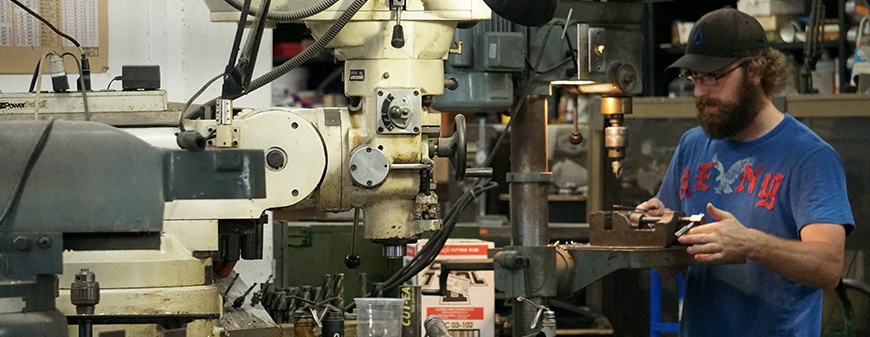TWS is a Great Training Option for Everyone
Learn more about how we can prepare you to advance your career.
The skilled labor shortage, the middle-skill gap and new-collar jobs—what do all these have in common?[1] They deviate from the notion that college is the only path to a good career.
America’s labor market is evolving rapidly. Companies need workers with the right skills, and NOW. So many, in fact, the problem has been dubbed “the economy’s War on Talent.”
Many firms simply can’t wait four years for workers to acquire the qualifications for the job from a university education. Offering streamlined career preparation, technical training programs are considered a solution and as the new place for companies to “collect potential job candidates.”
What exactly is technical training? How does it compare to college and other career prep options? And, most importantly, where could it take you in the job market?
Have You Considered a Career in the Skilled Trades?
Fill out the form to recieve a no obligation info packet.
Technical Training: Focused Career Preparation
One of the main reasons technical training, also known as vocational training, is stealing the spotlight from college is that it can be quick. Typically, ten weeks to two years.[2]
Some programs like welding training can be completed in a little as seven months.
How can technical training be so fast? Because trade schools teach students only the skills they’ll need for the career for which they’re training.
Learning the fundamentals of refrigeration, electrical wiring and similarly career-focused classes is required in a refrigeration technologies program.[2]
Who can benefit from technical training? Those who know what career they want and can prepare for it in trade school, as opposed to college. Trade school is generally a path to jobs requiring specific technical skills.[2]

New: Industrial Maintenance
Learn About Our New Advanced Industrial Maintenance Program
Tulsa Welding School is proud to announce our newest program offering available at our Houston & Dallas Metro Campuses – Advanced Industrial Maintenance Technology! Learn the skills you need to take on the industries of manufacturing, distribution, energy production and facility maintenance in as few as 7 months.
By contrast, college is often the route to careers in which extensive theoretical knowledge of a subject is necessary. For examples, lawyers and doctors have to become experts on complex laws and the innerworkings of the human body before they can enter their fields.[3][4]
Whether you’re a high school student set on learning a skilled trade, a mother reentering the workforce or someone who wants to change their career, technical training could be a good option for you.
Technical Training Vs. University, Community College and Tech Boot Camp

Continuing your education after high school can have many potential benefits. Higher earnings and lower levels of unemployment are two of the big ones, as noted by the Bureau of Labor Statistics.
When it comes to earning a post-secondary education, you have many options: university, community college, trade school and technical boot camp.
Which one should you should choose? That depends on several factors:
- Whether you learn better by doing or studying in a classroom.
- How much time and money you have to spend on your education.
- The credential and career you want after graduation.
Technical Training Career Options
What kind of technical careers could be waiting for a trade school graduate? There are options in many fields, and some are expected to see healthy job growth through 2026, according to the Bureau of Labor Statistics. Below we take a look at some careers in the skilled trades.
Skilled Trades Careers
- HVAC technician: 13 percent[5]
- Electrician: 10 percent[6]
- Solar photovoltaic installer: 63 percent.[7]
- Pipefitter: 14 percent[8]
- Ironworker: 11 percent[9]
Align Education With Career Goals
Technical training can prepare you for a wide range of careers at a fraction of the time and cost of a traditional university. One of the most important considerations when choosing a postsecondary education, however, is the career you want.
If you’re interested in entering the skilled trades, the medical field or the beauty and personal services industry, trade school could be a good option for you.
Discover more about the benefits of trade school.
[1] https://www.nationalskillscoalition.org/state-policy/fact-sheets
[2] https://study.com/vocational_schools.html
[3] https://www.bls.gov/ooh/legal/lawyers.htm#tab-4
[4] https://www.bls.gov/ooh/healthcare/physicians-and-surgeons.htm#tab-4
[5] https://www.bls.gov/ooh/installation-maintenance-and-repair/heating-air-conditioning-and-refrigeration-mechanics-and-installers.htm
[6] https://www.bls.gov/ooh/construction-and-extraction/electricians.htm
[7] https://www.bls.gov/ooh/construction-and-extraction/solar-photovoltaic-installers.htm
[8] https://www.bls.gov/ooh/construction-and-extraction/plumbers-pipefitters-and-steamfitters.htm
[9] https://www.bls.gov/ooh/construction-and-extraction/structural-iron-and-steel-workers.htm
This blog has been labeled as archived as it may no longer contain the most up-to-date data. For a list of all current blog posts, please visit our blog homepage at https://www.tws.edu/blog/







